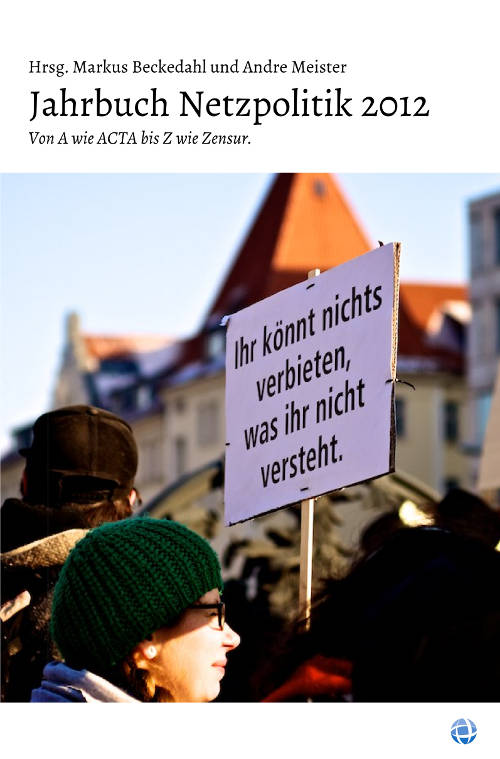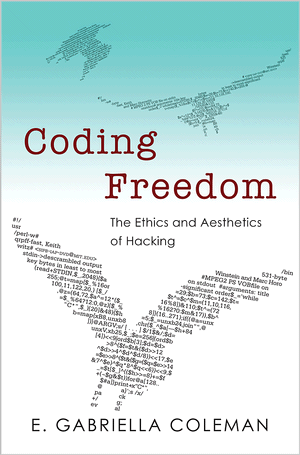Markus Beckedahl, Andre Meister (eds.): Jahrbuch Netzpolitik 2012: Von A wie ACTA bis Z wie Zensur (2012) [German]
Filed under book | Tags: · 2012, acta, anonymous, censorship, copyright, internet, net culture, politics, privacy, surveillance, web

Netzpolitik betrifft alle, jede und jeden. Was im Jahr 2012 wichtig war, was vielleicht auch zu kurz kam, darauf blickt dieses Jahrbuch zurück. Die Autorinnen und Autoren waren Beobachter und Akteur zugleich.
Ihre Berichte in diesem Buch fassen die wichtigsten Themen des Jahres zusammen, ordnen ein und reflektieren.
Von A wie ACTA und Anonymous über Open-Data und Überwachung bis zu Urheberrecht und Z wie Zensur: komprimiert, informiert und frei lizenziert.
Mit Beiträgen von: Jan-Phillip Albrecht, Markus Beckedahl, Annegret Bendiek, Mirko Boehm, Jörg Braun, Ulf Buermeyer, Gabriella Coleman, Leonhard Dobusch, Kirsten Fiedler, Karina Fissguss, Kilian Froitzhuber, Volker Grassmuck, Johnny Haeusler, Christian Heise, Jeanette Hofmann, Jōichi ‘Joi’ Itō, Andrea Jonjic, Matthias Kirschner, Julia Kloiber, Constanze Kurz, Lawrence Lessig, Falk Lüke, Lorenz Matzat, Tim Maurer, Joe McNamee, Andre Meister, Matthias Monroy, John F. Nebel, Frank Rieger, Alexander Sander, Ben Scott, Felix Stalder, Moritz Tremmel, Ben Wagner, Stefan Wehrmeyer und Jillian C. York.
Publisher Netzpolitik.org, December 2012
Creative Commons BY-SA 3.0 Germany License
ISBN 9783844242348
270 pages
via @BiellaColeman
E. Gabriella Coleman: Coding Freedom: The Ethics and Aesthetics of Hacking (2012–) [EN, SC]
Filed under book | Tags: · aesthetics, anonymous, anthropology, code, computing, ethics, floss, free software, hacker culture, hacking, intellectual property, internet, internet activism, software, web

“Who are computer hackers? What is free software? And what does the emergence of a community dedicated to the production of free and open source software–and to hacking as a technical, aesthetic, and moral project–reveal about the values of contemporary liberalism? Exploring the rise and political significance of the free and open source software (F/OSS) movement in the United States and Europe, Coding Freedom details the ethics behind hackers’ devotion to F/OSS, the social codes that guide its production, and the political struggles through which hackers question the scope and direction of copyright and patent law. In telling the story of the F/OSS movement, the book unfolds a broader narrative involving computing, the politics of access, and intellectual property.
E. Gabriella Coleman tracks the ways in which hackers collaborate and examines passionate manifestos, hacker humor, free software project governance, and festive hacker conferences. Looking at the ways that hackers sustain their productive freedom, Coleman shows that these activists, driven by a commitment to their work, reformulate key ideals including free speech, transparency, and meritocracy, and refuse restrictive intellectual protections. Coleman demonstrates how hacking, so often marginalized or misunderstood, sheds light on the continuing relevance of liberalism in online collaboration.”
Publisher Princeton University Press, 2012
Creative Commons Attribution-NonCommercial-NoDerivs 3.0 License
ISBN 1400845297, 9781400845293
264 pages
Responses: Jo Bates, Denisa Kera, Brett Lunceford, Jorge Luis Zapico, Alexander Halavais, Stéphane Leman-Langlois, Ethan Zuckerman
Reviews: James Grimmelmann (Jotwell: Cyberlaw, 2012), David Banks (Cyborgology, 2012), Eric Raymond (2013), Cade Metz (Wired, 2013), Mike Doherty (Hashbang, 2013), Bruce Byfield (Linux Mag blog, 2013), Bryan Behrenshausen (OpenSource.com, 2013), Roy S. Gutterman (Journalism & Mass Communication Q, 2014), Tim Jordan (American J Sociology, 2014), Emily T. A. Earl (Techno_ethno, 2014), Anne Elizabeth Yaniga (Techno_ethno, 2014), Sebastian Kubitschko (Culture Machine, 2014).
Coding Freedom (English, updated on 2013-1-18, PDF, EPUB [updated on 2014-9-2])
Kodiranje slobode. Etika i estetika hakovanja (Serbo-Croatian, trans. Ljubica Gotić and Predrag Todić, 2014)
Jenna Burrell: Invisible Users: Youth in the Internet Cafés of Urban Ghana (2012)
Filed under book | Tags: · actor-network theory, africa, electronic waste, internet, mass media, net neutrality, networks, spam, web, youth

“The urban youth frequenting the Internet cafés of Accra, Ghana, who are decidedly not members of their country’s elite, use the Internet largely as a way to orchestrate encounters across distance and amass foreign ties–activities once limited to the wealthy, university-educated classes. The Internet, accessed on second-hand computers (castoffs from the United States and Europe), has become for these youths a means of enacting a more cosmopolitan self. In Invisible Users, Jenna Burrell offers a richly observed account of how these Internet enthusiasts have adopted, and adapted to their own priorities, a technological system that was not designed with them in mind.
Burrell describes the material space of the urban Internet café and the virtual space of push and pull between young Ghanaians and the foreigners they encounter online; the region’s famous 419 scam strategies and the rumors of “big gains” that fuel them; the influential role of churches and theories about how the supernatural operates through the network; and development rhetoric about digital technologies and the future viability of African Internet cafés in the region.
Burrell, integrating concepts from science and technology studies and African studies with empirical findings from her own field work in Ghana, captures the interpretive flexibility of technology by users in the margins but also highlights how their invisibility puts limits on their full inclusion into a global network society.”
Publisher MIT Press, 2012
ISBN 0262017369, 9780262017367
Acting With Technology series
236 pages

